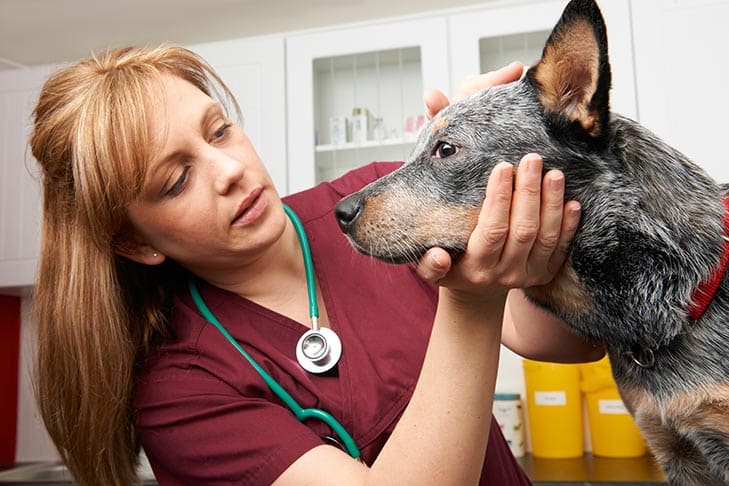Signs you may need a dog behaviourist near me for your canine companion
Understanding the Role of a Veterinary Behaviourist in Family Pet Training and Wellness
The role of a vet behaviourist is essential in dealing with the elaborate relationship in between pet dogs and their owners. They integrate vet medicine with understandings from pet behavior scientific research to tackle issues like aggressiveness and stress and anxiety. Unlike conventional instructors, their approach concentrates on the underlying sources of these behaviors. This nuanced viewpoint increases questions about the performance of traditional training methods and exactly how a deeper understanding can transform pet health. What techniques do they use to accomplish these results?
What Is a Vet Behaviourist?
A veterinary behaviourist is a customized professional who concentrates on understanding and addressing the behavior concerns of animals, particularly pet dogs. Their experience integrates vet medicine and pet behavior scientific research, enabling them to identify and treat a large range of behavior troubles - dog behaviourist near me. These experts often hold postgraduate degrees, such as a Master's or PhD in animal actions, and are certified by pertinent companies, guaranteeing they possess a deep understanding of pet psychology
Veterinary behaviourists examine pets through detailed monitoring and evaluation, considering aspects such as genes, environment, and training background. They create tailored habits adjustment strategies, which may consist of desensitization strategies, favorable reinforcement approaches, and ecological modifications. Cooperation with pet owners is essential, as they provide guidance and assistance throughout the training procedure. Ultimately, the goal of a vet behaviourist is to improve the wellness of the pet while fostering an unified partnership between animals and their proprietors.
The Significance of Comprehending Pet Habits
Understanding animal behavior is important for both family pet owners and experts in the area of pet treatment, as it lays the foundation for reliable communication and training. Identifying how pets perceive their atmosphere and react to stimuli allows caregivers to create a much more harmonious living scenario. Understanding right into behavior cues, such as body language and articulations, fosters more powerful bonds in between pet dogs and their owners. By appreciating the natural impulses and requirements of various varieties, individuals can customize their training approaches to fit these elements, promoting better learning and participation. Additionally, a strong grasp of behavior science help in determining stress factors and potential triggers, permitting proactive treatments. In general, recognizing pet behavior not only enhances the health of pet dogs yet likewise enhances the experiences of those that take care of them, ultimately resulting in healthier, happier connections.
Common Behavioral Issues Dealt With by Veterinary Behaviourists
Veterinary behaviourists frequently deal with typical behavior concerns in animals, including aggression and worry responses. They additionally concentrate on anxiety and tension monitoring, which can greatly influence a pet's wellness. Understanding these problems is crucial for creating effective training and treatment strategies.
Hostility and Worry Responses
While lots of pet dog owners may watch aggression and worry responses as simple behavior concerns, these complex responses frequently originate from underlying anxiousness or previous injury. Veterinary behaviourists play a vital function in recognizing the source of these behaviors, which can materialize in numerous forms, including growling, attacking, or excessive concern of specific situations. Understanding these triggers is crucial for developing effective training techniques tailored to each pet's unique conditions. Behaviourists employ methods such as desensitization and counter-conditioning to assist pets manage their concerns and aggression. In addition, they educate family pet proprietors concerning proper administration methods, emphasizing the importance of patience and consistency. Attending to aggressiveness and fear feedbacks not only enhances the family pet's lifestyle however additionally reinforces the bond in between pet dog and proprietor.
Anxiousness and Tension Management
Anxiousness and stress prevail problems that many family pets deal with, usually arising from adjustments in their atmosphere, absence of socializing, or previous negative experiences. Veterinary behaviourists play a crucial duty in identifying the underlying reasons of these concerns. They utilize different strategies, including behavior alteration, desensitization, and counter-conditioning, to help family pets handle anxiousness. Additionally, they might advise environmental modifications, such as producing secure spaces or offering enrichment activities that advertise relaxation. Cooperation with pet dog proprietors is essential, as behaviourists guide them in recognizing their family pet's signals and implementing reliable coping methods. By attending to anxiety and tension, veterinary behaviourists add greatly to improving the overall wellness and quality of life for family pets and their families.
How Vet Behaviourists Differ From Standard Instructors
Veterinary behaviourists differ from standard trainers mostly in their instructional backgrounds and training. While conventional fitness instructors usually focus on obedience and standard commands, vet behaviourists emphasize understanding and dealing with underlying behavior concerns, incorporating medical factors to consider right into their method. This distinctive emphasis allows them to provide a more complete treatment for family pets with intricate behavior challenges.
Education and Training Differences
Recognizing the distinction between veterinary behaviourists and traditional trainers is essential for animal owners looking for efficient training services. Vet behaviourists possess innovative levels in veterinary medicine, frequently complied with by specialized training in pet practices. This education and learning furnishes them to address complicated behavioural issues that might originate from clinical problems or mental aspects. In comparison, standard fitness instructors typically have accreditations from training programs that focus on obedience and basic commands without diving right into the underlying emotional or clinical elements. While both specialists intend to enhance animal practices, veterinary behaviourists can detect and deal with behavioural problems holistically, incorporating clinical expertise right into training techniques. This essential distinction highlights the significance of choosing the appropriate professional based on the animal's certain demands.
Emphasis on Behavioral Issues
Dealing with behavioral issues calls for a nuanced technique that differentiates veterinary behaviourists from traditional fitness instructors. continue reading this While traditional fitness instructors typically focus on obedience and basic commands, vet behaviourists check out deeper into the underlying reasons of problematic behaviours. They use a considerable understanding of pet psychology and behavior adjustment strategies, which are rooted in clinical research study. This proficiency allows them to determine problems originating from anxiety, concern, or aggression, as opposed to just dealing with surface-level symptoms. On top of that, vet behaviourists evaluate the pet dog's overall health, taking into consideration environmental elements and the pet's background. By incorporating clinical understanding with behavioral techniques, they supply customized remedies that promote long-lasting behavioral change, guaranteeing both the animal's and proprietor's lifestyle are noticeably boosted.
Clinical Considerations Included
While traditional fitness instructors might overlook underlying medical concerns, veterinary behaviourists prioritize a comprehensive evaluation of a family pet's health as a fundamental action in resolving behavioral troubles. This strategy enables them to recognize possible clinical problems that may contribute to undesirable behaviours, such as anxiety, pain, or neurological disorders. By integrating clinical analyses right into their technique, vet behaviourists can work together with veterinarians to assure a holistic understanding of the pet's health. In addition, they can advise proper therapies or changes to training strategies based upon medical searchings for. This considerable viewpoint distinguishes vet behaviourists from standard fitness instructors, as they deal with both behavioural and health-related variables, inevitably causing a lot more efficient and sustainable outcomes for pets and their proprietors.

The Process of Dealing With a Veterinary Behaviourist
Working together with a vet behaviourist entails a methodical strategy to dealing with a family pet's behavioral problems. The procedure begins with an extensive analysis, where the behaviourist collects detailed info concerning the pet dog's history, environment, and particular habits that are bothersome. This usually consists of questionnaires, interviews with the animal proprietor, and sometimes observations of the family pet in its setting.
Adhering to the evaluation, the vet behaviourist creates a customized intervention strategy that might include behavioral modification techniques, training approaches, and, if required, suggestions for medical examinations. board certified veterinary behaviourist. The plan is created to be practical and achievable, making sure that it fits seamlessly right into the pet dog proprietor's way of living
Subsequent follow-up sessions are vital to check progression, change strategies, and provide support. This joint effort not just aims to change unwanted actions yet also to boost the general well-being of the pet, making certain an unified relationship in between the animal and its proprietor.
Enhancing Your Animal's Top quality of Life Through Behavioral Assistance
Enhancing a pet's lifestyle through behavior support is essential for promoting a healthy and balanced and satisfying partnership in between animals and their proprietors (cat behaviourist near me). Veterinary behaviourists play a crucial role in determining and dealing with behavior concerns that may impede a pet's well-being. With tailored techniques, they help alleviate anxiousness, anxiety, and aggression, eventually advertising a more balanced and happy animal
Behavior assistance encompasses different techniques, consisting of favorable reinforcement, environmental enrichment, and socializing. By applying these techniques, owners can produce a caring setting that urges positive behaviors. This not just enhances the animal's psychological wellness yet also enhances the bond in between pet and owner.
Furthermore, routine examinations with a vet behaviourist assurance that any emerging behavioral concerns are quickly resolved, avoiding acceleration. In general, purchasing behavioral support is an aggressive approach that significantly enriches a pet's life, leading to boosted physical and psychological wellness end results.
Regularly Asked Concerns
What Certifications Do Veterinary Behaviourists Possess?
Vet behaviourists typically hold a vet level, adhered to by specialized training in pet habits. Lots of likewise possess certifications from recognized companies, demonstrating their know-how in attending to animal behavior concerns and advertising total pet wellness.
Can Veterinary Behaviourists Suggest Medicine for Animals?


Veterinary behaviourists, having vet degrees and specialized training, can without a doubt prescribe medicine for pets. This ability permits them to attend to underlying behavioral problems properly, frequently incorporating medicinal therapy with behavioral adjustment methods for ideal outcomes.
The Length Of Time Does Behavioral Treatment Typically Take?
Behavioral treatment period differs considerably, commonly check my source ranging from a few weeks to numerous months. Variables influencing this timeline include the animal's particular problems, uniformity of training, and the proprietor's involvement while doing so.
Are Remote Assessments Offered With Veterinary Behaviourists?

How Much Does a Veterinary Behaviourist Assessment Cost?
The cost of a vet behaviourist examination normally ranges from $100 to $300, depending on variables such as place, experience, and session length. Added charges may look for follow-up assessments look at this site or specialized solutions.